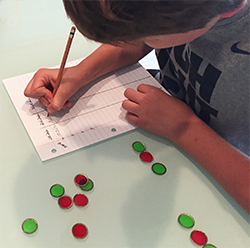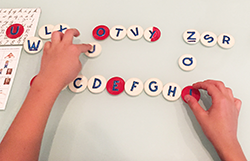Imagine Doing Something That is Difficult for You to Do
It could be singing, running, sewing, cooking, figuring out how to program your DVR, operating your smartphone, just about anything.
 Now, think about having to do that difficult task six hours a day, five days a week, one-hundred-and-eighty days a year, plus one to two hours a night, and an hour or two on the weekend.
Now, think about having to do that difficult task six hours a day, five days a week, one-hundred-and-eighty days a year, plus one to two hours a night, and an hour or two on the weekend.
How would you feel? Would you want to do it? Would you argue with the person who was asking you to do it? Would you come up with reasons to avoid doing the task? Would you give up? That’s how children and adolescents with dyslexia and/or ADHD feel about reading and about school. School is not a fun place for them. The concept of “loving to learn” is foreign to many of these kids.
Welcome to Pathways To Reading Success
 My name is Robin Hegner and I offer instruction and remediation in reading, spelling, writing and vocabulary using the Orton-Gillingham approach. I am certified by The Orton-Gillingham Academy. I am also certified as a dyslexia therapist by the International Dyslexia Association.
My name is Robin Hegner and I offer instruction and remediation in reading, spelling, writing and vocabulary using the Orton-Gillingham approach. I am certified by The Orton-Gillingham Academy. I am also certified as a dyslexia therapist by the International Dyslexia Association.
In addition to my expertise in working with children with dyslexia, I have extensive experience working with students diagnosed with ADHD, helping them learn ways to improve their focus, organization, and study skills.
Children with dyslexia and ADHD are as intelligent as their peers. Their brains, however, are wired differently, and they often need to learn in a different way. Individualized, multi-sensory instruction has been proven to work with thousands of these students.
My approach to helping students is to meet them where they are and move forward together. Instruction is done in a positive environment that takes into account the students’ individual learning needs and styles and builds on the students’ strengths to overcome their limitations. I move as fast as I can, but as slow as I must; I work at the student’s ability level and pace of learning, not a predetermined pace set by a curriculum. Once the student has mastered a skill, then we move on.
These learning difficulties are not outgrown and early intervention yields the best results, but students of all ages benefit from this type of instruction. Don’t delay. The earlier your child receives this instruction, the sooner you and your child will see the benefit. In addition to improved reading and learning, students will gain self-confidence when they realize they have the tools to be successful in school!
What is Dyslexia?
Dyslexia is a language-based learning disability that is neurobiological in origin.
 Characteristics of dyslexia include difficulties with accurate and/or fluent word recognition and poor spelling and decoding ability. The difficulties typically result from a deficit in the phonological component of language that is unexpected in relation to the student’s intelligence and classroom instruction. In addition to decoding and fluency difficulties, students often experience problems in reading comprehension, vocabulary, and background knowledge.
Characteristics of dyslexia include difficulties with accurate and/or fluent word recognition and poor spelling and decoding ability. The difficulties typically result from a deficit in the phonological component of language that is unexpected in relation to the student’s intelligence and classroom instruction. In addition to decoding and fluency difficulties, students often experience problems in reading comprehension, vocabulary, and background knowledge.
—Adapted from the International Dyslexia Association
Dyslexia is not outgrown, but appropriate intervention will allow a student to achieve success in school and life.
To see a list of some noteworthy and successful people with dyslexia, CLICK HERE.
How is Dyslexia Identified?
A multidisciplinary evaluation is necessary to properly identify if a student has dyslexia. It’s important that it is not mistaken for something else. Consequently, a good evaluation will include medical, academic, developmental, social, and instructional information.
Intelligence
Phonological Awareness
Reading Comprehension
Vocabulary
Spelling
Rapid Naming
Memory
Attention/Executive Functions
